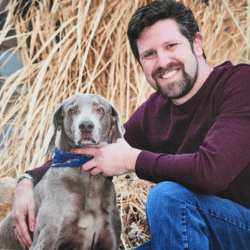Dogs are good at finding unusual places to sleep. It’s amazing how tightly a giant breed like a Great Dane can fit under furniture, or how much space a tiny chihuahua can take up spreading themselves out in a sunbeam.
But why is your dog sleeping or lying in such unusual places? We asked Not A Bully’s veterinary team and here’s what Dr. Menicucci and Dr. Patel came up with:
“Dogs may sleep in odd places for several reasons, including their natural instinct to find a safe spot, feeling stressed, or trying to stay close to their owners.
Sometimes, they might seek out cooler or warmer places to sleep due to temperature changes. Because the weather can change quickly, these new sleeping locations can appear to happen suddenly.
However, if your dog suddenly starts sleeping in strange places, especially if accompanied by other behavioral or physical changes, it might be due to discomfort or illness, and a visit to your veterinarian is recommended. “
We’ll take a closer look at each explanation and help you figure out which explanation makes the most sense for your dog. We’ll also explore some solutions to help you change their behavior if your dog is sleeping in strange places that are problematic. Let’s get started!
Reason 1. Your Dog Is Denning
For most dogs, the instinct to find a safe den will explain their unusual sleeping spot. Denning is a perfectly normal behavior that many dogs exhibit. Some dogs make real dens by digging holes and laying in them.
Or your dog’s modern den of choice could be under the bed, which is a great spot for privacy or stashing toys. Laying under your desk is a strange spot too, but it allows your dog to hide and still be close to you, especially if you work from home! Dr. Menicucci notes that “Many of my pups love to sleep in kennels or under desks. It’s a safe place for them and they can stay close to me while they’re under the desk.”
Denning is reminiscent of your dog’s wolf ancestors. Wolves like to dig a den (under a tree, a boulder, or a natural cave) for safety when they are preparing to give birth, so while it may sound strange to us humans, a den is their first experience and home. Female dogs exhibit the same denning behavior when they are whelping.
As Dr. Patel further explains “For many dogs, the den is their crate which can be a safe space like the den of their ancestors. Even though our dogs don’t have to worry about predators in our homes, the instinct to find a safe space to sleep is still active.”
This is why ethical breeders always make sure they build a proper whelping box for pregnant females, otherwise, they might end up lying down in weird places like under a porch to give birth.
Therefore, if your dog’s first worldly experience is in a den-like space where it is safe, it is no wonder they like to find weird cramped spaces to lay down and sleep.
Reason 2. Your Dog is Trying To Be Near You
While the instinct to den might explain a lot of strange sleeping locations, places like between your legs are not den-like, but an unusual and inconvenient spot (albeit cute spot) for your dog to lay down.
You might have a velcro dog, who is desperate to be near you no matter what unusual place it forces them to lie down. A velcro dog is a clingy dog who always wants to be near you and might end up sleeping in some weird place to be near you.
Wanting to be close to you is, of course, normal for our dogs but if you believe your dog’s attachment is excessive or unhealthy, they might have separation anxiety, which veterinarians Debra Horwitz and Gary Landsberg define as dogs that “become extremely anxious and show distress behaviors such as vocalization, destruction, or house soiling when separated from the owners.”
Besides laying down in weird places to be as close to you as possible, you might see symptoms similar to general anxiety, especially if your dog thinks you are about to leave.
Reason 3. Your Dog Is Scared Or Stressed
We have a strong connection with our canine companions and dogs might pick up on our stress. Often, our dogs mimic our emotions: we are happy they get excited, and when we are stressed they might hide in a weird place until our emotional state changes.
Of course, it’s not always your fault your dog is anxious. Loud noises like fireworks, changes in routine, or turmoil in their home life can cause fear and anxiety in your dog. While some dogs become clingy when nervous, others will choose to find an unusual place to lie down and wait out the scary situation.
You can help your dog calm down by encouraging them to choose the crate as their safe space.
Use positive methods like counterconditioning and desensitization to help make the crate more comfortable for them and not only ease their fears but distract them from what they are worried about. Using treats in the crate is a great tool, as well as crate-appropriate toys or providing comforting objects like those with your scent.
However, Dr. Menicucci points out that it’s critical to “identify and address the root cause of the stress or fear as well.” If your dog is still anxious, they could be suffering from general anxiety. Other symptoms of dog anxiety include:
- Excessive panting
- Accidents in the house
- Drooling
- Pacing
- Depression
- Destructive behaviors
If you are worried your dog has anxiety, please reach out to your veterinarian or a dog trainer for help. I recommend a CPDT-KA trainer or someone with similar experience. If you’re local to Colorado, you can work directly with Not A Bully Dog Training.
Reason 4. Seasonal Changes And Temperature Regulation
Dogs regulate their temperature through panting and the sweat glands in their paws. But sometimes dogs need a little extra help keeping warm or cooling down.
In many cases, pet parents might see these changes as occurring suddenly when in reality it’s a direct response to that snowy day or heatwave.
Your Dog Is Hot
The tile floor of a kitchen or bathroom is probably the coolest surface in your house. The tile retains cold temperatures, making it ideal for sleeping dogs that get hot easily, especially in the summer.
And some dogs run hot no matter what the season is and will choose to lay in the cooler parts of the house, and they can discover some unusual places. Is there a vent in that weird corner of the house? Maybe they are enjoying the air conditioning.
Your Dog Is Cold
My dogs slept on the stone in front of our fireplace consistently until I finally took the hint and placed a dog bed there so they could be warm and comfy.
On a cold sunny day, they might follow the sun around, putting them in weird positions like laying against walls, on hard floors, or under furniture, soaking up the warmth from the sun. Do not worry, your dog knows not to look at the sun and will move before they become overheated.
In this video, you can see three dogs laying in weird positions to place warm up in a sunbeam.
While it might seem like they are extra snug, dogs of all sizes will lie on your stomach to steal your warmth. Yes, they are using you, but it is very sweet to have such a cuddling companion on a cold winter day.
Dr. Menicucci adds that while regulating temperatures is normal “extreme temperatures, both hot and cold, can be dangerous for dogs and adequate protection should be provided.”
Reason 6. Your Dog Is Not Feeling Good
Sometimes a sudden change of behavior can be a sign of a health issue. This includes them suddenly lying down or sleeping in weird places. If they are suddenly plopping down on walks or sleeping on hardwood floors when they have always enjoyed their comfortable beds, it could be a sign that they are injured or in pain.
Older dogs and giant breeds are more prone to joint stiffness and arthritis and if they are laying down in strange places, they might be trying to get more comfortable. Your veterinarian can prescribe your dog anti-inflammatory or pain medication if your dog is hurting.
Laying down in unusual cramped places, especially if denning is a new behavior for your dog, might also mean they are feeling sick. Other signs your dog is ill include:
- Vomiting and diarrhea
- Coughing
- Lack of appetite
- Lethargy
- Accidents in the house
- Bloated stomach
- Stiffness or trouble standing up
If you are worried about your dog sleeping in strange places, or they are showing any other symptoms, please go see your veterinarian immediately!
Should I Be Worried?
Laying down or sleeping in weird places should only worry you if it is a new behavior, and you should keep an eye on it.
Old dogs have normal stiffness and might seek out new and unusual places to sleep to become more comfortable. Injured young dogs might show the same behavior, and catching problems like Hip Dysplasia or a TPLO injury early means a faster recovery time and more time adventuring with your best friend.
Lastly, if you think your dog is lying in weird places because they are sick and trying to hide from you, please make sure you take it seriously. Especially if they are showing any of the other symptoms listed above!
However, Dr. Patel adds “Sometimes these initial signs can cue us into some beginnings of old age and cognitive decline changes as well.”
How Can I Change This Behavior?
Before trying to change this behavior, first rule out any medical issues. If they are sleeping in strange places because they are sore or sick, they might need a little extra attention from your veterinarian.
However, if they are young and healthy and are lying down in weird places that are problematic, (for example under the porch, under the dining room table, or in a room or closet they might accidentally get locked in), then you can use positive reinforcement methods to work on a couple of solutions.
If your dog likes denning, try crate training. Many dogs come to love laying in their crate and will choose to sleep in there rather than in strange places.
Another alternative behavior you can train with your dog if they are lying in weird places is mat training. Kikopup shows you how to train your dog to automatically go to their bed in this video, but you could also use a blanket, rug, or towel.
Final Thoughts
Dr. Menicucci told Not A Bully: “I’ve encountered many cases where changes in sleeping habits were early indicators of health issues ranging from arthritis to anxiety. It’s crucial to balance an understanding of natural canine behaviors with an awareness of when these behaviors might signal something more concerning. Regular communication with your veterinarian and a keen observation of your dog’s habits are key in ensuring their well-being.”
In other words, sleeping in strange spots isn’t a concerning behavior on its own, but it’s important to look at the big picture for your pup, especially when changes happen suddenly!



